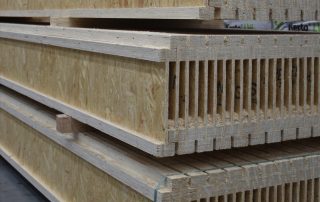When it comes to floor joist systems in residential and multi-residential construction, engineered solutions continue to grow in popularity, and for good reason. Builders today are choosing joist systems like Metsa Finnjoists, that are not only strong and compliant, but also quick to install, quieter to walk on, and easier to source.
A great product from ATS Building Products in this space are Metsa Finnjoists, now available in a new 300×63 size. In this article, we explore why more builders are using Finnjoists, and how they compare to other popular floor joist systems like POSI struts.
What Is a Finnjoist?
A Finnjoist is an engineered I-beam floor joist manufactured by Metsä Wood. It consists of a high-strength Kerto® LVL flange bonded to an OSB3 web, delivering a lightweight, structurally stable beam that performs exceptionally well in timber floor systems.
Finnjoists are designed to span further, reduce floor movement, and minimise on-site challenges like shrinkage or deflection. They’re precision manufactured and arrive site-ready, helping speed up framing and reduce delays.




New Size: Finnjoist 300×63 Now Available
In response to demand for more flexible sizing in longer-span applications, ATS Building Products now stocks the 300×63 Finnjoist, a deeper and more versatile option for builders looking to cover greater spans while maintaining installation simplicity.
Key Benefits of Finnjoists
Straighter and lighter than solid timber
Reduced floor bounce and superior rigidity
Faster installation with minimal on-site trimming
Quieter underfoot compared to metal alternatives
Reliable supply with shorter lead times than many other engineered joist systems
Available in multiple depths to suit common frame heights
Compatible with services (plumbing, HVAC, electrical)
Finnjoists are also certified to meet Australian Standards and are manufactured under strict quality control systems to ensure compliance and structural reliability.
Finnjoist vs POSI Struts
Here’s a practical comparison between Metsä Finnjoists and traditional POSI struts, based on what builders care about on-site:
| Feature | POSI Struts | Metsä Finnjoists |
|---|---|---|
| Weight | Heavier (metal and timber mix) | Lighter and easier to handle |
| Noise Transfer | Louder underfoot | Quieter floor performance |
| Lead Time | Longer (fabricated to order) | Typically in stock or short lead |
| Installation | Requires care during setup | Fast, consistent, and pre-cut |
| Depth Flexibility | Fixed configurations | Multiple depths available |
Frequently Asked Questions
They’re generally lighter, straighter, and more consistent than solid timber. They also allow longer spans and reduce the risk of floor bounce.
Yes. They are engineered with service penetrations in mind and often include guides for hole locations to accommodate electrical, HVAC, and plumbing runs.
Yes. Metsä Finnjoists are manufactured to meet structural performance standards in Australia and are produced under ISO 9001 certified processes.
– Finnjoist – CE marked, and the design properties are determined according to ETA 02/0026.
– Finnjoists – BM TRADA Q-Mark certificate.
– Kerto LVL – CE and UKCA marked, designed to EN 14374 standards.
– Kerto LVL – AS/ANZ 4357.0 Structural LVL compliant.
– Kerto LVL – AS1720.1 Timber Stress Grade compliant.
– Kerto LVL and Finnjoist production is to ISO 9001 Quality Assurance.
– ISO 14001 Environmental Management standards.
– Responsibly sourced and PEFC Certified.
Yes, they’re often used in townhouses, duplexes, and modular builds due to their consistency and reduced floor noise.
Finnjoists are available in a range of depths, including the newly stocked 300×63 section. Other common sizes can be ordered depending on project requirements.
As construction timelines tighten and expectations rise around quality, noise performance, and consistency, engineered timber joists like Metsä Finnjoists are becoming the go-to option for modern floor systems.
With the addition of the 300×63 size now in stock, builders have more flexibility than ever to choose a product that delivers strength, ease of installation, and performance that lasts.

